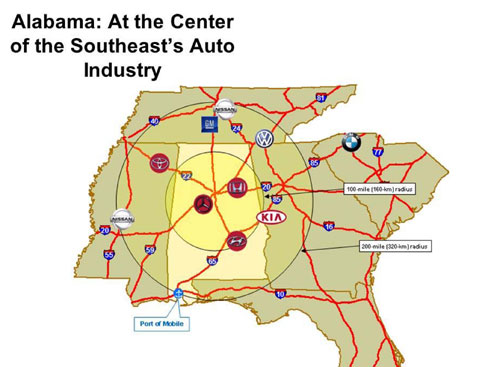The View from 30 Feet
State of Alabama Recruits Manufacturing
by Jen Clark
Plastics Business

The Economic Development Partnership of Alabama has led efforts to market its state as an automotive and aerospace leader. Since 1997, more than 6.3 million cars and light trucks have been produced in Alabama. It also is home to a growing automotive supplier network serving OEMs in Alabama and neighboring states.
Learn more
Business gurus often talk about the view from 30,000 feet – the big picture that provides a look at overall operations. Perhaps, however, the focus should be on the view from 30 feet – a close-up of specific processes and procedures that make an impact now.
Google the term "auto industry" and the search engine returns a slew of Detroit-related articles detailing the ups and downs of one of America's most storied industries. Detroit, after all, is home to the "Big Three" automobile manufacturers – General Motors, Ford and Chrysler.
But one economic development group aims to challenge the notion that the epicenter of the American auto industry is in Detroit. The Economic Development Partnership of Alabama has led efforts to market its state as an automotive and aerospace leader, while also working to attract investment in virtually every industry sector. Since 1997, more than 6.3 million cars and light trucks have been produced in Alabama, which is home to vehicle assembly plants for Mercedes-Benz, Honda and Hyundai; engine assembly plants for Toyota (original equipment manufacturer) and Navistar. It also is home to a growing automotive supplier network serving OEMs in Alabama and neighboring states.
"We have the presence of German, Japanese and Korean manufacturers and have moved from no production 20 years ago to some 915,000 vehicles last year," said Bill Taylor, EDPA's president. "It has created an interesting picture when it comes to not just the OEM, but at the tier 1 and tier 2 (level). We came to realize, as the industry has matured in Alabama, there was a need for additional businesses to be present in the state to help support and supply services to the OEM."
Over the last year, the Birmingham, AL-based group has worked to recruit companies and get them to invest in Alabama. One area that caught EDPA's attention was the plastics industry, specifically mold-making. "There are a lot of mold shops located in the US," Taylor said. "We've tried to educate them about what's been going on in the automotive industry and the support systems around the industry, as well as what is going on in Alabama. It is surprising sometimes because a lot of people up north don't understand what has been happening down here in the last couple of decades."
EDPA serves as a recruiter to get those businesses to expand into Alabama, rather than relocate. "We see tremendous opportunities for businesses to grow here," Taylor said. "We are now No. 5 in the nation in manufacturing of automobiles. And the number of platforms across different models also is growing. It adds to the potential opportunities for these companies to set up shop and do business with the companies that already are here."
Steve Sewell, EDPA's executive vice president, explained that EDPA began by looking at mold-makers in the Windsor, Ontario-area and in Michigan that might already be doing business in the southeast region of the US and have the capability and size to potentially make an investment in the region. The recruiting process begins with meetings to understand the support that the company would need, especially in terms of workforce training and education programs. "As a result, we've taken educators into those companies so they can see first-hand the skill-sets that are needed," he said. "There's a real commitment – at the highest levels among educators and elected officials – to put these programs in place to meet the needs of these companies."
The companies then are invited to visit Alabama "so they can get a better picture of the auto industry here," Sewell said. "We try to be really strategic in looking at some of the needs that we have and try to recruit to that need. We want to support the sustainability of our industry. We show them there is a real business opportunity here, as well as a need."
Added Taylor: "We're not talking to anyone about moving their facility. We talk to them about expansion. It's an opportunity for growth. And, they're often shocked at what they see. It is something you see more up north – with the tradition of auto-making – it's newer in our region." EDPA hosted seven company visits to Alabama in November as part of its targeted tool and die program, but none of those companies have committed to an expansion at this point.
EDPA is structured to work closely with state, regional, corporate and local organizations. "We have aligned education so we are working hand-in-hand with educators so we have the skill sets for manufacturers to be successful when they get here," Taylor explained. "It speaks volumes for the state and education system to respond to these needs. You're not going to find anything higher-tech than what we have here."
An added bonus for companies expanding into Alabama is the opportunity to work on a global scale. "We have German, Japanese and Korean manufacturers," Taylor said. "It brings some of these companies into the international market. It's yet another opportunity for their growth."
Still, it's the state's commitment to manufacturing that makes the sell. "We have a high number of manufacturers and long history of manufacturing in various sectors," Sewell said, noting aerospace is the newest addition. "It's about commitment. Who's still supporting manufacturing? Who wants to have a dynamic, robust manufacturing sector? The leadership of the state of Alabama supports it. That's the kind of environment companies are going to look for."
